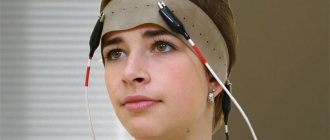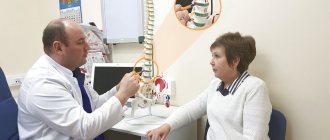Allergology is a branch of medicine that studies allergic reactions and diseases associated with them, elucidates their etiological causes, mechanisms of development and clinical manifestations. In addition, allergology develops methods for diagnosing, treating and preventing allergies among people.
As a separate branch in medicine, allergology arose relatively recently and remains inextricably linked with many disciplines, and primarily with immunology. Every year, the number of patients suffering from allergies increases, which makes an allergist an extremely sought-after specialist.
It is important that the doctor not only has an impressive knowledge base in his field, but also knows how to put it into practice and can differentiate between a cold and an allergy attack in a patient. Identifying the causes and prescribing adequate treatment are the primary tasks facing the specialist.
An allergist is a doctor who deals with the prevention of hay fever, food allergies and other types of allergic reactions, solves problems with correcting the immune system, and gives recommendations regarding proper nutrition and lifestyle in general. If necessary, the doctor recommends that the patient visit other specialists, such as: an immunologist, nutritionist, dermatologist, ophthalmologist, gastroenterologist, otolaryngologist, etc.
What does an allergist do?
It is often difficult to identify the cause of an allergic reaction in the body on your own. In this case, a specialist comes to the rescue.
The main directions of its activities are the following:
- Diagnosis, therapy and prevention of bronchial asthma, atopic dermatitis, conjunctivitis, hay fever, rhinitis, Quincke's edema and other diseases.
- Prescription of full subseasonal, short or year-round allergen-specific therapy.
- Diagnosis and correction of the immune system.
- Restoration and further maintenance of the body’s protective functions.
There are many known diseases that occur against the background of reduced immunity; allergic reactions of the body are no exception. That is why you can often hear the combination of the words allergist-immunologist. The specifics of this doctor’s work include not only the fight against allergic manifestations of the body, but also the normalization of the immune status.
Treatment methods
After conducting all the necessary research and identifying the cause of discomfort, a course of treatment is selected individually, which may include: antihistamines; sorbents; topical ointments; antihistamine serums and ointments; calcium gluconate, bronchodilators; sedative medications, special diets and correction of usual lifestyle.
Best materials of the month
- Coronaviruses: SARS-CoV-2 (COVID-19)
- Antibiotics for the prevention and treatment of COVID-19: how effective are they?
- The most common "office" diseases
- Does vodka kill coronavirus?
- How to stay alive on our roads?
What tests should you take when visiting an allergist?
The doctor, depending on the patient’s complaints and symptoms, will recommend that the patient undergo one or more of the following tests:
- Scraping from the tonsils, surface of the tongue, from the ear canal for further cytological examination. This analysis is performed if a mycotic lesion is suspected.
- Stool analysis to exclude dysbacteriosis or to identify sensitivity to bacteriophages.
- Blood for bacteriological culture.
- Determination of the flora of ulcers, scrapings from the surface of the dermis, from the ear canals, etc.
- PCR diagnostics to identify a specific virus, bacteria or mycoplasma.
- Analysis of blood serum for specific IgE, for general IgE, which indicate sensitivity to pollen, dust, fungal and food allergens, etc.
- Performing test techniques, for example, princ testing, scarification test.
The diagnostic examination plan may be changed. Sometimes it is necessary to perform an x-ray, undergo a CT or MRI, perform a provocative test with allergens, etc.
Diagnostic methods
During the appointment, the doctor, in conversation with the patient, based on his medical history, prescribes a series of tests to determine the type of allergen; clarifying the form of the disease; development of an optimal treatment regimen; and also monitors treatment; selection of prevention methods; clarification of housing maintenance rules; development of individual instructions for allergy sufferers (with medications to relieve acute allergy attacks); Carrying out examinations of patients who are registered.
In order to determine the irritating factor as accurately as possible and make an accurate diagnosis, it is possible to prescribe additional studies, including: skin tests (provocations, prick test); pulse oximetry; detailed study of the functioning of the external respiratory organs; spirography, bronchoscopy, specific allergy testing, spirometry, CT and x-ray of the lungs.
The following tests are prescribed: a blood test for the presence of antibodies that provoke allergies; serological and microbiological research; stool analysis to determine dysbacteriosis, parasites and helminths; blood culture tank; collection of secreted fluids from the nose, eyes, ears.
When should you take your child to see an allergist?
An allergist is a doctor who treats not only adults, but also children. If a child experiences allergy symptoms that are similar to those of adults, you should immediately consult a doctor for advice. The fact is that the immune defense of children is not fully formed. If an existing allergy is not detected in time, it will become a serious threat to the health and even life of the child.
Parents need to be especially attentive with children under one year of age, when they begin to introduce their first complementary foods. In general, when introducing new food products, you need to monitor the reaction of the child’s body and, if necessary, consult a doctor.
Educational program on medical professions. What does an allergist-immunologist treat?
Does your child have an itchy skin rash? Or can no one determine the cause of constipation? Cold season has passed, but you can't get rid of your runny nose?
Its manifestations are diverse. With questions about allergies and the doctors who treat them, we go for a consultation with Ulyana Vladimirovna Chemova, an allergist-immunologist at Clinic Expert Smolensk LLC.
- Judging by the name of your profession, you primarily treat allergies. We often hear this word and even get scared by it, but rarely does anyone understand what is hidden behind it? Ulyana Vladimirovna, what is an allergy and how is it dangerous?
An allergy is an abnormal, atypical reaction of the body to common irritants to which a healthy person does not react. These can be objects of a wide variety of nature: food products, household items, animal wool and fluff, plant pollen, various professional agents and many others.
What are seasonal allergies and how to treat them? Read here
The danger of allergies is that the number of allergens to which a person reacts may increase under certain conditions. The manifestations of allergies may become more severe, including due to an increase in the number of organs suffering from allergic inflammation. Those. if, for example, at first only the skin reacted, then later the mucous membrane of the nose, larynx, and then the trachea and bronchi may be involved in the process.
There are very severe allergic reactions (for example, anaphylactic shock in response to medications, insect bites) that can threaten the patient’s life.
Therefore, under no circumstances should an allergy be left to chance: you should consult a doctor immediately after the first signs, even the most insignificant ones, appear.
- Is allergy a disease of children or does it also occur in adults?
Allergies occur in all age groups, although each of them has its own characteristics of the pathological process. For example, children are more likely to react to food, while adults are more likely to react to allergens in the air.
- What are the symptoms of allergies in adults?
More often these are manifestations from the eyes, nose (and other respiratory organs): lacrimation; redness and itching in the eyes; runny nose, nasal congestion, dry mucous membranes, itching in the nose; dry, hacking cough or coughing; hoarseness of voice; sensation of a “lump” in the throat; difficulty swallowing; feeling of “tingling”; difficulty breathing; shortness of breath on exertion; suffocation.
Sometimes there are skin symptoms in the form of rashes and itching.
- Are the signs of allergic reactions in children and adults the same or different?
The symptoms are similar, however, as I said earlier, there are differences in manifestations from different organs. For children, signs of damage to the skin and digestive tract are more typical.
When the skin is involved, a rash appears. Its location depends on age, i.e. in younger children these are the cheeks, buttocks, and flexor surfaces of the legs.
From the gastrointestinal tract, constipation or diarrhea, abdominal pain, sometimes reminiscent of acute surgical pathology (in particular, appendicitis), and bloating are noted.
What to do if your child has a stomach ache? Chief Pediatrics Physician Says
LLC "Clinic Expert Smolensk", surgeon Alexey Alexandrovich Zakharov
In adults, when the skin is affected, the rash is located more in the area of the shoulders, legs and ankle joints, extensor surfaces of the legs, buttocks, back and chest, wrist joints, on the back of the hands, fingers, and neck. The nature of the rashes also differs: in children, weeping, spots, and redness are more common. In adults, traces remain on the skin in the form of increased pigmentation, a pronounced skin pattern (a kind of reticulation of the skin), and peeling.
- Are there situations when the onset of allergies occurs in adulthood in a person who was not even familiar with diathesis in childhood?
Yes. This occurs, for example, under severe stress, pronounced hormonal changes in the body, massive contact with some substances (for example, in sawmills, in factories, at hairdressers).
- What can serve as a provoking factor for the development of allergies in an adult?
Working in hazardous industries, smoking, serious illnesses (including infectious ones) or surgical interventions, hypothermia or overheating, moving to another climate zone, pregnancy.
-Which allergens most often affect adults?
Their main allergens are household ones, i.e. dust and small mites living in it. In second place are molds. Then there are animal allergens. Food is less relevant. Of the food products that most often cause allergies in adults, fish, eggs, milk, and nuts. Allergy to pollen occurs seasonally.
- How to find out what an adult is allergic to?
Diagnosis includes, first of all, a detailed medical history, performing allergy tests and laboratory tests for the suspected allergen(s).
You can find out the cost of an appointment with an allergist and sign up for a consultation here
- Is it possible to cure allergies in adults forever, or once they occur, will they bother the person for the rest of their lives?
Theoretically, it is possible to get rid of it: there are examples of long-term absence of allergies after treatment. However, there is no guarantee that it will not arise again someday. Sometimes there are spontaneous remissions: for example, there are examples of the cessation of allergies after menopause.
- Your specialty is written and sounded with a hyphen. You are not only an allergist, but also an immunologist. So, should I also contact you if I have problems with the immune system?
Yes, that’s right, since allergy manifestations are a problem with the immune system.
What is immunity and how to strengthen it? An allergist-immunologist tells
Chemova Ulyana Vladimirovna
- Ulyana Vladimirovna, how do you understand that you need to see an allergist-immunologist, and not a dermatologist?
It is not always possible to determine this 100%, but there are important points that can help. These are manifestations such as the presence of itching of the skin, a connection perceived by a person with some agent, including repeated ones - be it food, some kind of chemical substance (for example, a cleaning agent, powder, etc.), an animal, a plant, medicine, season of the year. If a person has already consulted an allergist or knows that he has/has relatives in his family with a history of allergies, this may also indicate the need to consult an allergist.
If you still find yourself in the wrong place, the doctor, having ruled out his pathology, will refer you to related specialists.
Need a consultation with a dermatologist? You can find out the price and sign up here
- How is an appointment with an allergist? Do you need to prepare for it, for example, do some tests first?
In general, the technique consists of classical stages, i.e. survey, inspection. A distinctive feature is, perhaps, a very detailed survey on the history of life and disease, since it is this that provides the decisive information on which we rely when making a diagnosis.
After this, laboratory tests are most often prescribed. However, it is not advisable to take any tests without first visiting an allergist, since there is a high probability that these tests will be the wrong ones, or their range will be incomplete. The only exceptions may be a general blood and urine test, which can be taken in advance.
Among the preparatory measures: it is better to come on an empty stomach so that immediately after the consultation, if necessary, you can take tests. No other preparation is required.
-Is it possible for a modern person to avoid allergies? How to avoid becoming its “victim”?
Prevention of allergic diseases is of great importance. As for the prevention of allergies in children, it all starts from the moment the baby is expected. Proper nutrition of a woman during pregnancy and the postpartum period, and, accordingly, of the child, also plays an important role.
“Do’s” and “don’ts” in the diet of a nursing mother. How to eat properly for a young mother?
Elena Anatolyevna Chemburova, a pediatrician at Clinic Expert Tula LLC, tells the story.
The fact of a hereditary predisposition to allergies is of great importance: in this case, the issues of introducing complementary foods, and later - the child’s nutrition, are worked out in detail; you should weigh the pros and cons before getting a pet; do not use any kind of dietary supplements, food additives, etc., without the consent of an allergist; ensure an optimal microclimate at home, avoid dampness and prevent the appearance of mold; no smoking; harden the child; optimize your daily routine with sufficient rest, including sleep; limit the time you work with electronic devices (tablets, etc.); Do not self-medicate under any circumstances, do not use immunomodulators unnecessarily; do not change the climate zone unnecessarily.
For reference:
Chemova Ulyana Vladimirovna
In 2006 she graduated from the Smolensk State Medical Academy.
In 2006-2007, she completed an internship in the specialty “Pediatrics”.
In 2013 - primary retraining in the specialty “Allergology and Immunology”.
Since December 2021, he has been working as a pediatrician and allergist-immunologist at Clinic Expert Smolensk LLC.
Advantages of the clinic of the Research Institute of Pediatrics of the Central Clinical Hospital of the Russian Academy of Sciences
- Advanced diagnostic and laboratory equipment for quick and accurate diagnosis of various diseases in children.
- An individual approach to each child, taking into account age characteristics, personal preferences and wishes of the parents.
- Clear and accurate answers to all questions related to the child’s health.
Based on the examination results, a diagnosis is established and an individual treatment plan is developed in accordance with the principles of evidence-based medicine. Our doctors use domestic and international clinical recommendations in their work. The child will not be prescribed a single unnecessary examination or procedure; he will not receive a single extra pill or drug with unproven effectiveness.
All allergists and immunologists at our Clinic have extensive experience in the treatment of allergic diseases in children using allergen-specific immunotherapy (ASIT) using standardized drugs.
What personal qualities should an allergist have?
Important personal qualities for a specialist:
- self-control;
- self-discipline;
- observation;
- attentiveness;
- responsibility;
- Analytical mind;
- good memory;
- tact;
- empathy;
- emotional stability;
- good learning ability.
The doctor must inspire trust and respect in the patient and encourage communication. Without these qualities it is impossible to perform professional duties well.
Consultation with a children's allergist in Moscow
During the appointment, the doctor collects information about the characteristics of the mother’s pregnancy and childbirth, general development, the child’s lifestyle, vaccinations, previous diseases and allergic predisposition. The doctor will ask in detail about the complaints with which the patient arrived.
The next stage of the consultation is an examination of the child, which includes:
- weight and height measurement;
- examination of the throat and mucous membranes;
- assessment of the condition of the skin;
- assessment of the condition of the lymph nodes;
- palpation of the abdomen;
- listening to the lungs and heart.
At a consultation with a pediatric immunologist, after the doctor has collected complaints and anamnesis, on the same day the child can undergo a comprehensive examination using modern equipment (spirometry, X-ray and CT diagnostics, determination of nitric oxide in exhaled air, skin testing, determination of specific IgE antibodies using the ImmunoCAP method, which is the gold standard for allergy diagnostics).
Diagnosis and treatment of allergic diseases
Before starting treatment, the allergist identifies the allergen . Sometimes this is not difficult, as, for example, in the case of insect bites or food consumption. But, unfortunately, in most cases the nature of allergies is not clear, and even asking the patient does not help determine it. In these cases, the following is carried out:
- allergy skin tests - application of allergens to the skin
- more complex provocative tests
- biochemical and immunological blood tests.
After identifying the allergen, the doctor gives recommendations on how to limit contact with it and what medications and foods should be avoided. He also prescribes specific treatment, which is aimed at the pathogenesis (mechanism) of allergic reactions and elimination of symptoms.
Prevalence of allergies among children and adolescents:
Allergy has earned the name “new epidemic” and this is not surprising - over the past 20 years, its incidence in the world has increased 3-4 times. According to experts, almost 30% of the world's population suffers from allergies. In addition, there is a tendency towards the emergence of more severe forms of this disease. Medical reference books are constantly replenished with new names, and pharmacologists invent the latest drugs. Manifestations of allergies become more diverse from year to year. There are several reasons for this: air pollution, an abundance of preservatives in food products, new construction and finishing materials that release toxic substances, drug abuse - all this suppresses the immune system and provokes an incorrect reaction of the body.
How to understand: allergies or colds?
Allergies and colds have similar symptoms: runny nose and nasal congestion, watery eyes, pain in the eyes. This is how allergic rhinitis and conjunctivitis manifest themselves. People cannot always understand that the cause of illness is allergens, and they attribute negative symptoms to a cold.
With ARVI, it’s not just a runny nose and a sore throat. A sick person experiences a headache, body aches, and feels overwhelmed. With an allergic reaction, such symptoms practically do not occur or are mild. The same applies to rising temperatures. Allergy sufferers encounter a similar manifestation only with a severe exacerbation of the disease, and with ARVI, a temperature above 37 ° C is a typical phenomenon.
A characteristic feature of allergic rhinitis is copious discharge of watery mucus from the nose, which is accompanied by itching. Allergy sufferers are forced to constantly rub their nose, they also note swelling of parts of the face, redness and itching of both eyes. Drops and other anti-cold medications do not give the desired effect and provide relief for a very short time.
With an infectious runny nose, the discharge is thick and has a greenish or yellowish tint. Congestion may only be on one side, the sense of smell decreases or completely disappears.
Allergic rhinitis can be combined with a common infectious runny nose. To finally be convinced of the reasons for the deterioration in health, you need to make an appointment with a therapist, who will make a diagnosis or refer you for examination to an allergist.
Causes of allergies in children:
Food allergies are the most common in children . In most cases, an allergic reaction is associated with poor nutrition of the mother during pregnancy, as well as during breastfeeding. Frequent colds can be a provoking factor. With colds, the mucous membranes of the nasopharynx are damaged, which facilitates the penetration of allergens into the body. As a result, the so-called household or epidermal allergy develops.
In the spring, the body is attacked by pollen from flowering plants, which can lead to the development of hay fever - pollen allergy . Parents should be aware that early contact with a children's allergist can prevent the development of such a serious disease as bronchial asthma.











